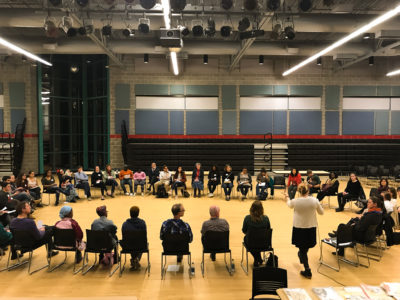
On Tuesday, Feb. 27, the Center for Career, Life and Service’s service and social innovation team hosted a “poverty simulation.” This event, brought to the College by Iowa State University Office of Extension and Outreach, was held specifically for Grinnell College students in the Service Learning Work-Study program.
The aim of the event was to “provide an introductory opportunity to expand dialogue, inspect personal biases and improve interactions [surrounding poverty],” wrote Keira Wilson, assistant director of service and social innovation, in a follow-up email to the participants of the event.
“As new or continuing members of the larger Grinnell and Poweshiek community, especially in the areas of service learning work-study and community engaged work like volunteering, understanding issues like poverty and other elements at play are essential in becoming an effective part of the community,” Wilson wrote.
T o simulate such issues, students and other community members, including employees of the CLS and College President Raynard Kington, were put into “family groups” within the fictional “State of Poverty” community. These family groups had members who were unemployed, working part-time or employed but struggling. Over the course of an hour-long simulated “month,” the families were asked to interact with community resources to keep their home groups secure — in other words, pay the utilities, rent and other bills, along with buying food and ensuring that their children went to school.
Before beginning, the organizers from the Iowa Extension office stressed that the simulation should not be thought of as a game because as they put it, “no one wins at poverty.” Participants raced through their allotted hour in a frenzy to make ends meet. At the end of the month, out of about eight family groups, only one or two groups had not been evicted.
Following the simulation, Wilson called the participants together for a chance to reflect, opening the floor for discussion and encouraging people to share how they felt during the simulation.
“Poverty is the big elephant in the room that we operate around and with that, we don’t have the chance to talk about a lot,” Wilson said.
“It made me [think] how helpless you can be, even if you try your absolute best, if you can’t pay for something, or you can’t get to it, it crumbles and falls apart,” said Vivienne Kerly-de la Cruz ’20 of her experience in the simulation.
“The hardest thing was organizing my priorities,” agreed Sara Castro ’21.
Nai’ya Willis-Hogan ’20 observed the simulation, having had an idea of what she expected to see beforehand.
“When I first heard of a poverty simulation coming to campus, I was offended, so I came to observe,” Willis-Hogan said. Already prepared to speak, Willis-Hogan recited a short essay about her anger and dismay surrounding the idea of a poverty simulation, which included the lines, “don’t co-opt my struggle … don’t simulate my struggle.”
The administering of the simulation presented poverty as something with which the greater Grinnell community faces, but some felt that it did not adequately acknowledge that for many college students, poverty is their reality.
“The students are right, it can be damaging if we don’t take into account the limitations of a simulation,” said Susan Sanning, CLS director of service and social innovation.
The discourse presented by Willis-Hogan began the type of dialogue that Wilson encouraged.
“A single class or workshop cannot totally encompass the intersecting nature of poverty and that exists here in rural Iowa, let alone fully articulate the complexity of how multiple intersecting identities come into play. Without continued dialogue and discussion there is potential to essentialize an experience or over simplify systematic issues,” Wilson wrote, sharing that a student reached out to her by phone to share how uncomfortable they were to learn during the simulation of Grinnell’s lack of family shelters. Wilson wrote, “if is the only action that emerges, then it will be a conversation that has successfully extended beyond talking into practice.”




























































